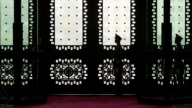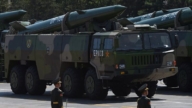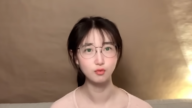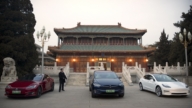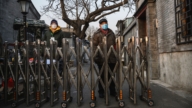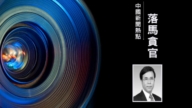【新唐人2013年04月23日讯】中共中央政治局近期带头开展所谓党的“群众路线”教育活动。活动要求贯穿“照镜子、正衣冠、洗洗澡、治治病”的全过程。什么是“照镜、正衣、洗澡、治病”?它与中共政权的历史有什么倾向性?会不会和毛泽东在1942年开始的“延安整风运动”一样?或只是中共内部清除异己的活动?下面请看专家的分析:
中共中央政治局19号召开会议,由总书记习近平主持会议。会议决定从今年下半年开始,用一年左右时间,在中共党内自上而下、分批开展所谓:党的群众路线教育实践活动。会议强调,这是新形势下坚持“党要管党、从严治党”的重大决策。
会议中还提到,当前,中共党员干部存在着不符合为民务实清廉要求的问题。特别是有的领导机关、领导班子和一些领导干部形式主义、官僚主义、享乐主义突出,奢靡之风严重。甚至以权谋私、腐化堕落。这些问题,严重损害党在人民群众中的形象,严重损害党群、干群关系,必须认真加以解决。
这场活动,被外界解读为中共新一次的“整党运动”,也是中国大陆一场新的政治运动来临的征兆。
据了解,在前中共党魁毛泽东尤其是邓小平之后,中共历任党政领导人发动的“整党运动”,已经形成了一种历史小传统。政论家胡平表示,习近平前任的每个党魁上台,都在做同样的事情。
政论家胡平:“胡锦涛那时候什么‘保先’,什么共产党‘先进性教育’。习近平显然他受毛那套影响太大,用的词用的话语都还是毛的那一套,像什么‘洗澡’啊,‘治病’啊﹗‘洗澡’就是和‘洗脑’是一个意思。”
胡平表示,早期共产党对知识份子进行思想改造,就叫“洗澡”。叫干部上楼洗手、洗澡,就是对干部进行审查。问题小就叫洗洗手,问题大点叫洗个澡,其实就是进行清理的意思。胡平说,这与习近平前段时间所提的“反腐”并非一回事。
胡平:“而像‘整风’,那就是整思想问题、路线问题,关键是,他是一个摆明了强化自己的统治地位,清除异己的一个问题。你说你要反腐,你不是见贪官你就整,属于你这派的贪官你就不整,你整的都是你不喜欢的那一端,但是毕竟是总抓住别人的腐败问题,那你现在搞‘整风’,那很明显就是‘顺你者昌、逆你者亡’了。”
《新华社》在通稿中历数“整党”的必要性,声称这次活动“以县处级以上领导机关、领导班子和领导干部为重点”。媒体认为,这已经构成习、李上位之后、至今为止规模最大的一场全党性运动,不可避免的将波及到普通党员。
原大陆史学教授刘因全:“习近平可能通过这件事情,来整顿吏治。我们知道中国的官员已经非常的腐败了,他用了好多办法,比如说:号召、教育、也抓了一些人呀,但是呢,不可能从根本上解决。他又不想进行政治体制改革。怎么办呢?他就想用像整风这种形式,来整顿干部。”
通稿中反复强调“思想教育”,对纪委和司法手段却不置一词,因此,“整党”的成效令人质疑。原大陆史学教授刘因全认为,习近平不可能真正的实现宪政民主,而所谓的整风,也搞不深。
刘因全:“至于是不是能够搞成像延安整风那样呢?我想应该不会,因为习近平呢,他不大可能拥有像毛泽东那个时候,那么大的权威来搞成那样的运动。”
刘因全表示,虽然这个做法会起到一些作用,因为有一些人会因为害怕而有所收敛,但是并不会从根本上解决中共的腐败问题。
胡平也认为,习近平将继续沿袭中共一党专制的做法,没有任何改革的趋势。
采访/刘惠 编辑/周平 后制/李勇
Is a new rectification movement coming to China?
The Central Committee of the Chinese Communist Party
(CCP) recently spearheaded the so-called “mass line" educational activities.
Officials are required to “look in the mirror,
check appearance, shower, and treat illnesses.”
What do these activities mean?
Are they related to the regime’s political history?
Is this the same movement as Mao Zedong’s Yan’an
Rectification Movement in 1942 or just a means to remove dissidents within the CCP?
On April 19th, the Central Committee held its 19th meeting,
chaired by the General Secretary, Xi Jinping.
The outcome of the meeting is that starting from the second
half of 2013, for a duration of 12 months, the CCP will carry
out mass line educational activities, adhering to the major
principles of “managing the party strictly.”
Many issues were brought forth, such as CCP cadres
failing to serve the people or remaining incorruptible.
Some leaders engage in formality, bureaucracy,
and hedonism.
Others have abused power and have become corrupt
and degenerated.
These issues seriously tarnish the party image among
the people and seriously damage relationships between party groups.
They must be addressed.
This event has been widely interpreted as the party’s new
movement–a sign of a new political movement in China.
It is understood that after former leaders Mao Zedong
and Deng Xiaoping, it has become a tradition for the new leader to initiate a “Party Rectification Movement.”
Political commentator Hu Ping said that leaders
before Xi Jinping all did the same thing.
Political commentator Hu Ping: “Hu Jintao had his ‘staying
advanced,’ or advanced education.
Xi Jinping has been deeply influenced by Mao and likes
to use the same rhetoric, such as, ‘showering and treating illnesses.’
Showering means brainwashing, and they
are interchangeable.
In the early stage, when the CCP wanted intellectuals
to reform, they ordered cadres to go upstairs to wash their hands or take a shower for cadres’ review.
If you have a small problem, it is called hand washing;
a big problem is called showering.
It means, ‘‘to clean up.’”
Hu Ping points out that this differs from
Xi Jinping’s anti-corruption.
Hu Ping: “Rectification is an ideological problem
or routing problem.
The key is strengthening one’s own control
and letting go of dissidents.
During the process of rectification, you want to fight against
corruption, but you don’t handle all corrupt officials the same way.
If they are in your camp, you let them off.
You always rectify mistakes of the other camp
or people you dislike.
So, the rectification movement obviously means,
‘prosper if you are with me, or you’ll perish.’”
A Xinhua News Agency article stressed the need
for “a whole party," claiming that these activities focus
on the leading units and leading cadres above
the county level.
The media believes that this is the largest whole party
movement since Xi-Li took office.
It will inevitably spread to ordinary party members.
Liu Yinquan, former history professor: “Xi Jinping
may use this to rectify officialdom.
We know that Chinese officials have been very corrupt.
He has tried many different methods, such as education
and jailing a few officials.
However, it cannot fundamentally solve the problem.
Xi does not want political reform, but what else can he do?
Therefore, he wants to use these activities
to rectify the cadres.”
The article also repeatedly stressed ideological education,
but not a word was written about the Law and Politics Committee or judicial branches.
Therefore, the results from party rectification
will be doubtful.
Prof. Liu believes that Xi can neither fill the constitutional
democracy dream nor carry out the rectification deeply.
On whether this will be as big a movement
as the Yan’an Rectification, he said, “I don’t think so,
because Xi Jinping does not have that much
power to mess with that kind of movement.”
Liu Yinquan said this would have some effect, because some
people will change somewhat due to fear, but it does not fundamentally resolve the corruption problem in China.
Hu Ping also believes that Xi Jinping will continue to follow
the one-party authoritarian practice, and there will be no reform.


